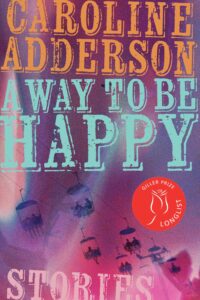Words Jackie LaPlante
 The book club I have belonged to for eight years has pledged to read one short story collection each year. It was not a decision that came naturally, but we have come to value and appreciate the craft of a well-written story. Mark Twain’s oft-quoted “I didn’t have time to write a short letter, so I wrote a long one instead”, may also refer to short stories, where every word must be the perfect choice, and every sentence jam-packed with intention.
The book club I have belonged to for eight years has pledged to read one short story collection each year. It was not a decision that came naturally, but we have come to value and appreciate the craft of a well-written story. Mark Twain’s oft-quoted “I didn’t have time to write a short letter, so I wrote a long one instead”, may also refer to short stories, where every word must be the perfect choice, and every sentence jam-packed with intention.
Vancouver author Caroline Adderson’s story collection, A Way to be Happy, offers eight unrelated stories that consider the small changes that can make a person happy. Set primarily in Vancouver and surrounding area, the geographical familiarity is a bonus.
“The Procedure” investigates the psyche of a middle-aged man fearing a colonoscopy. His wife has become disinterested in him, and the sense of loss he feels for their relationship is palpable and sympathetic. The loneliness of the recently-divorced middle-aged female character of “Homing”, who moves to a mining town to re-set her life, is equally convincing.
“Obscure Objects” is experimental, alternating a factual account with a fictionalized story. “From the Archives of the Hospital for the Insane” is historical, following women unwillingly committed to care in the early 1900s.
“Started Early, Took my Dog” and “All our Old Acquaintances are Gone” both raise the tension level. In the former story, a man stalks a family; in the second, two drug addicts move, uninvited, between parties in chic Vancouver condos, thieving as they go. The main characters are in situations that are discomfiting, yet in that discomfort each finds something that provides ease.
Adderson’s stories feature people from all walks of life: their problems may never be our problems, and their little happinesses may be inadequate to us, but the characters are so empathetic that seeing them find some comfort is a welcome relief.
As is too often the case with short stories, the frustration comes in the fact that they are, indeed, short. No sooner does the reader get involved in a character’s life than the story is over. While abrupt endings can often be puzzling, they force the reader to make thoughtful consideration of the author’s intention.
Sometimes the lesser time commitment of short story collections is exactly the right thing. The three books suggested below each vary in locales and genres, but all are detailed snapshots of the human experience.
1. Interpreter of Maladies by Jhumpa Lahiri
2. Moccasin Square Gardens by Richard Van Camp
3. Bream Gives me Hiccups by Jesse Eisenberg




